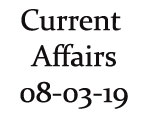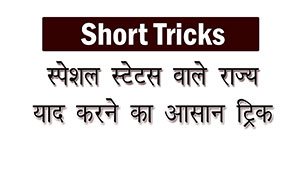-
Current Affairs 8th March 2019
Updated : 13-Mar-2019
Current Affairs 8th March 2019 - Important Points
- NABL launches quality assurance plan for basic composite medical laboratories in - February 2019
- New measures to promote Hydro Power Sector approved by - Cabinet
- Google launched Bolo app to assist children read in Hindi, English on - 6th March 2019
- India Restricts Import of Solid Plastic Waste declared by - The Ministry of Environment, Forests & Climate Change has corrected the Hazardous & other Wastes 2016
- NCGG signed pact with IICA for support in use of infrastructure facilities on - 6th March 2019
- PM Modi released new series of visually impaired friendly coins; 12-edged Rs 20 coin released on - 7th March 2019
- Collaboration between ISRO & CNES for - Gaganyaan project.
Current Affairs 8th March 2019 - Details
NABL launches quality assurance plan for basic composite medical laboratories in - February 2019
The National Accreditation Board for Testing and Calibration Laboratories- NABL released a voluntary plan known as Quality Assurance Plan for basic composite medical labs in February 2019 for sensitising small laboratories to basic achievable quality practices.
The plan is believed to bring transformational change in above 5000 laboratories over the coming five
years and to transform them into labs delivering quality service.
Eligibility Criteria
The labs performing only basic routine tests including blood sugar, blood counts, rapid tests for common
infections, LFTs, RFTs and routine tests of urine are entitled to apply under the plan.
Important Highlights- The plan needs minimal documentation and a nominal fee, has been prescribed for availing the plan.
- The components of competence assessment have been supplemented for assuring quality and validity of test results.
- The plan will assist to bring quality at the root level of India’s health system where labs follow the
imperatives of quality in all their procedures. - This will, in order, inculcate the habit of quality and simplify the labs to attain benchmark accreditation of ISO 15189 over a period of time.
- The labs may promote to accreditation according to ISO 15189 at any point of time.
- The successful labs will be issued a certificate of compliance to the scheme by National Accreditation Board for Testing and Calibration Laboratories and they will be permitted to utilise a distinct symbol on the test reports as a mark of endorsement to the basic standard for a defined time frame before which they will have to transition to full accreditation in accordance with ISO 15189.
New measures to promote Hydro Power Sector approved by - Cabinet
The Union Cabinet led by PM Narendra Modi has sanctioned measures to encourage the Hydro Power
Sector, which comprise declaring Large Hydropower Projects as part of non-solar Renewable Purchase
Obligation.
The following are some of the important measures approved by the cabinet:
Large Hydropower Projects to be announced as a renewable energy source. According to the present
practice, only hydropower projects less than 25 MW are branded as a renewable energy source.
HPO as a distinct entity within non-solar renewable purchase responsibility to cover large hydropower
projects initiated after notification of these measures. The small hydropower projects are already enclosed under the Non-Solar Renewable Purchase Obligation.
The trajectory of yearly HPO targets will be alerted by Ministry of Power based on the projected capacity addition plans in Hydropower sector and the essential modifications will be announced in the tariff policy and tariff guidelines to operationalise HPO.
The tariff rationalisation measures include delivering flexibility to the developers to regulate tariff by
backloading of tariff following growing project life to 40 years, raising debt repayment period to 18 years and introducing escalating tariff of 2%.
They also comprise budgetary support for funding flood moderation component of hydropower projects on case-to-case basis.
They also include budgetary support for funding cost of enabling infrastructure i.e. roads and bridges on
case-to-case basis according to actual, limited to Rupees 1.5 crore per Megawatt for up to 200 Megawatt projects and Rupees 1.0 crore/megawatt for above 200 megawatt projects.PM Modi released new series of visually impaired friendly coins; 12-edged Rs 20 coin released on - 7th March 2019
The PM Narendra Modi on March 7th, 2019 released the new series of visually diminished friendly
circulation coins of Rupees 1, Rupees 2, Rupees 5, Rupees 10 and Rupees 20.
The coins were released at a function in New Delhi where visually impaired children were specially invited.
Significance
The new circulation coins with various distinguishing features, will greatly support the visually impaired.
The coins will simplify the visually impaired Divyang community, & will instil them with confidence.
Features of the coins released- Various new features have been combined in the new series of circulation coins to make it easier for the visually impaired people to utilise them.
- The coins are categorized by the increasing size & weight from lower to higher currencies.
- Excluding for the 12-edged polygon shaped Rupees 20 coin, the rest of the currency coins are of round shape.
- The newly included coin of Rupees 20 is a 12-sided coin with no serrations. It is of a 12-edged polygon shape.
- The outside diameter of Rupees 20 coin is 27 mm & weighs 8.54 gms.
- The composition of the new coin is 65% copper, 15% zinc & 20% nickel for the outer ring, & 75% copper, 20% zinc & 5% nickel for the inner ring.
Obverse side of Rs 20 coin - The face bears the Lion Capitol of Ashoka Pillar with “Satyamev Jayate” emblazoned below.
- The left periphery is decorated with the word Bharat in Hindi the right periphery has the word &
- INDIA Reverse side of Rupees 20 coin, bears currency value of ‘20’ with the rupee symbol shown above.
- The left side comprises the design of grains, depicting the agricultural dominance of the nation.
The year of casting in international numerals is displayed on centre of left periphery of the coin.
Google launched Bolo app to assist children read in Hindi, English on - 6th March 2019
Search engine giant Google on March 6th, 2019 released a new app known as “Bolo” that goals to assist
children in primary school to read in Hindi & English.
The app, which is being released in India 1st, works on Google's speech recognition & text-to-speech technology. It comes with a built-in fun & supporting reading buddy, an animated character known as “Diya”. The reading material available on the app will be fully free of cost.
Important Features- The animated character “Diya” inspires children to read stories aloud & assists if the child is unable to pronounce a word/understand its meaning. The character also praises the reader when he/she completes the reading.
- Apart from assisting in reading, the app would permit children to play interesting word games and earn in-app reward, badges, assisting reading become both fun & a daily habit.
- Multiple children would be able to utilise the same app with their progress tracking and over the time the difficulty level of suggested stories will adjust as per to their reading skills.
- The free app has been outlined to work offline, in order to enable children to just focus on reading.
Further, the app has been deinked with children's safety & security all personal data shared will always stay on the device. The subscriber will not be asked for email ID & gender details for logging into the app. - The app presently comprises about 100 stories in Hindi and English & additional will added with time.
- The app will be available for download on Google Play Store in India for all smartphones running android 4.4 & higher versions.
India Restricts Import of Solid Plastic Waste declared by - The Ministry of Environment, Forests & Climate Change has corrected the Hazardous & other Wastes 2016
The Ministry of Environment, Forests & Climate Change has corrected the Hazardous & other Wastes (Management & Transboundary Movement) Rules, 2016 to entirely restrict the import of solid plastic waste.
Restriction on Imports- The modification notified by the Ministry of Environment, Forests and Climate Change fixes an excuse which formerly permitted the import of plastic waste into India for processing.
- The restriction on the import of plastics is in lines with the principles of sustainable development.
- To make sure the restriction doesn’t adversely impact the ease of doing business, the modification
permits the reverse import of defective electrical and electronic assemblies and machineries manufactured in & exported from India, within a year of export. - The reverse import can be undertaken without any advance permission from the Environment Ministry.
- The Hazardous and other waste management rules also delivers an exemption to the waste Silk exporters from needful permission from the Ministry of Environment, Forest and Climate Change.
- India is exploring various decisions to discourage the usage of single-use plastics and also is stressing the recycling of the plastic waste to decrease the burden on the environment thereby delivering economic advantages.
NCGG signed pact with IICA for support in use of infrastructure facilities on - 6th March 2019
The National Centre for Good Governance- NCGG on March 6th, 2019 inked a MoU with the Indian Institute of Corporate Affairs- IICA for support in the usage of infrastructure facilities during the National Centre for Good Governance training program at New Delhi.
The signing of the MoU was witnessed the Secretary of Department of Administrative Reforms and Public Grievances, K V Eapen and Indian Institute of Corporate Affairs Director General and CEO Dr.Sameer Sharma.
National Centre for Good Governance
The national centre has been formed by the union government under the Department of Administrative
Reforms & Public Grievances, which comes under the Union Ministry of Personnel, Public Grievances & Pensions.
The centre goals to promote good governance via capacity building on public policy and governance both at the national as well as International Level and carrying out studies with action research on issues relating to governance.
Indian Institute of Corporate Affairs
The IICA institute was recognised on September 12th, 2008 under the Union Ministry of Corporate Affairs.
The IICA institute was formed with the primary aim of creating, managing, maintaining and running a world-class institute.Collaboration between ISRO & CNES for - Gaganyaan project.
ISRO & France Space Agency CNES have settled to collaborate on the following avenues of maritime
surveillance and training programme for Gaganyaan project.
Maritime Surveillance
Indian Space Research Organisation and France Space Agency CNES have inked an arrangement to form a maritime surveillance centre in the nation. The pact intends to supply an operational system for
detecting, identifying and tracing ships in the Indian Ocean, provides for a maritime surveillance centre to be form in India, sharing of capacity to process current satellite data and joint development of related algorithms.
Indian Space Research Organisation and France Space Agency CNES will construct a constellation of
satellites for maritime surveillance envisioned to identify and track ships in the Indian Ocean.
Training for Gaganyaan project
Indian Space Research Organisation & France Space Agency CNES have inked a pact to train Indian
Scientists for the “Gaganyaan” project at the Toulouse Space Centre, France. Indian Scientists will also
be trained at CADMOS, the centre for development of microgravity applications & space operations, & the MEDES Space Clinic, France. India has also inked a pact with Russia for the “Gaganyaan” Project














